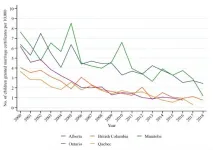(Press-News.org) Study of 1,733 patients first diagnosed in Wuhan (China) between January and May followed to June and September.
76% of COVID-19 patients have at least one symptom six months after symptom onset.
Fatigue or muscle weakness is the most common symptom, with sleep difficulties and anxiety or depression also frequently reported.
Lower antibodies against COVID-19 in patients six months after becoming ill compared with during acute infection raises concerns about the possibility of re-infection.
More than three quarters of COVID-19 patients have at least one ongoing symptom six months after initially becoming unwell, according to research published in The Lancet.
The cohort study, looking at long-term effects of COVID-19 infection on people hospitalised in Wuhan, China, reveals that the most common symptom to persist is fatigue or muscle weakness (63% of patients), with patients also frequently experiencing sleep difficulties (26%). Anxiety or depression was reported among 23% of patients.
Patients who were severely ill in hospital more often had impaired lung function and abnormalities detected in chest imaging - which could indicate organ damage - six months after symptom onset.
Levels of neutralising antibodies fell by more than half (52.5%) after six months in 94 patients whose immune response was tested at the peak of the infection, raising concerns about the possibility of being re-infected by the virus.
Little is known about the long-term health effects of COVID-19 as few follow-up studies have so far been carried out. Those that have been conducted looked only at a small number of cases over a short follow-up period (typically around three months after discharge).
Professor Bin Cao, from National Center for Respiratory Medicine, China-Japan Friendship Hospital and Capital Medical University, said: "Because COVID-19 is such a new disease, we are only beginning to understand some of its long-term effects on patients' health. Our analysis indicates that most patients continue to live with at least some of the effects of the virus after leaving hospital, and highlights a need for post-discharge care, particularly for those who experience severe infections. Our work also underscores the importance of conducting longer follow-up studies in larger populations in order to understand the full spectrum of effects that COVID-19 can have on people." [1]
The new study included 1,733 COVID-19 patients who were discharged from Jin Yin-tan Hospital in Wuhan, China, between January 7th and May 29th 2020. Patients had a median age of 57 years. Follow-up visits were done from June 16th to September 3rd, 2020, and the median follow-up time was 186 days.
All patients were interviewed face-to-face using questionnaires to evaluate their symptoms and health-related quality of life. They also underwent physical examinations, lab tests, and a six-minute walking test to gauge patients' endurance levels. 390 patients had further tests, including an assessment of their lung function. In addition, 94 patients whose blood antibody levels were recorded at the height of the infection as part of another trial received a follow-up test.
At follow-up, 76% of patients (1,265/1,655) reported at least one ongoing symptom. Fatigue or muscle weakness was reported by 63% (1,038/1,655), while 26% (437/1,655) had sleep difficulties and 23% (367/1,733) experienced anxiety or depression.
Of the 390 patients who underwent additional testing, 349 completed the lung function test (41 were unable to complete the test due to poor compliance). Patients with more severe illness commonly had reduced lung function, with 56% (48/86) of those at severity scale 5-6 (who required ventilation) experiencing diffusion impairment - reduced flow of oxygen from the lungs to the bloodstream. For patients at severity scale 4 (who required oxygen therapy) and those at scale 3 (who did not require oxygen therapy) the figures were 29% (48/165) and 22% (18/83), respectively.
Patients with more severe disease performed worse in the six-minute walking test (which measures the distance covered in six minutes), with 29% of those at severity scale 5-6 walking less than the lower limit of the normal range, compared with 24% for those at scale 3, and 22% for scale 4.
The authors also found that some patients went on to develop kidney problems post-discharge. As well as the lungs, COVID-19 is known to affect other organs, including the kidney. Lab tests revealed that 13% (107/822) of patients whose kidney function was normal while in hospital had reduced kidney function in follow-up.
Follow-up blood antibody tests from 94 patients after six months revealed that levels of neutralising antibodies were 52.5% lower than at the height of infection. The authors say this raises concerns about the possibility of COVID-19 re-infection.
As the number of participants with antibody test results both at acute phase and follow-up was limited, larger samples are needed in future to clarify how levels of antibodies against the virus change over time. Further work is also needed to compare differences in outcomes between inpatients and outpatients, as patients with mild COVID-19 symptoms who stayed in temporary Fangcang shelter hospitals were not included in the study.
Impaired lung function and exercise capacity observed in the study cannot be directly attributed to COVID-19 as baseline data for these are unavailable. Due to the way the data was analysed, it also was not possible to determine if symptoms reported during follow-up were persistent following the infection, worsened after recovery, or occurred post-discharge.
Writing in a linked Comment, Monica Cortinovis, Norberto Perico, and Giuseppe Remuzzi, from the Istituto di Ricerche Farmacologiche Mario Negri IRCCS, Italy, who were not involved in the study, remark on the uncertainty regarding the possible long-term impacts of COVID-19 on health, saying: "Unfortunately, there are few reports on the clinical picture of the aftermath of COVID-19. The study by Huang and colleagues in The Lancet is therefore relevant and timely."
Echoing the study authors' calls for further research, they add: "Even though the study offers a comprehensive clinical picture of the aftermath of COVID-19 in hospitalised patients, only 4% were admitted to an intensive care unit (ICU), rendering the information about the long-term consequences in this particular cohort inconclusive. Nonetheless, previous research on patient outcomes after ICU stays suggests that several COVID-19 patients who were critically ill while hospitalised will subsequently face impairments regarding their cognitive and mental health and/or physical function far beyond their hospital discharge."
INFORMATION:
Peer-reviewed / Observational study / People
NOTES TO EDITORS
This study was supported by the Natural Science Foundation of China, Chinese Academy of Medical Sciences Innovation Fund for Medical Sciences, the National Key Research and Development Program of China, Major Projects of National Science and Technology on New Drug Creation and Development of Pulmonary Tuberculosis, Peking Union Medical College Foundation (China Evergrande Group, Jack Ma Foundation, Sino Biopharmaceutical, Ping An Insurance (Group), and New Sunshine Charity Foundation). A full list of researchers involved in the study, and their affiliations, can be found in the Article.
The labels have been added to this press release as part of a project run by the Academy of Medical Sciences seeking to improve the communication of evidence. For more information, please see: http://www.sciencemediacentre.org/wp-content/uploads/2018/01/AMS-press-release-labelling-system-GUIDANCE.pdf if you have any questions or feedback, please contact The Lancet press office pressoffice@lancet.com
[1] Quote direct from author and cannot be found in the text of the Article.
COVID-19 patients admitted to intensive care in the early months of the pandemic were subject to a significantly higher burden of delirium and coma than is typically found in patients with acute respiratory failure. Choice of sedative medications and curbs on family visitation played a role in increasing acute brain dysfunction for these patients.
That's according to an international study published Jan. 8 in The Lancet Respiratory Medicine, led by researchers at Vanderbilt University Medical Center in coordination with researchers in Spain.
The study, which is far the largest of its kind to date, tracks the incidence of delirium and coma in 2,088 COVID-19 patients admitted before April 28, 2020, to 69 adult intensive care units across 14 countries.
ICU delirium is ...
Hundreds of cancer patients have benefitted from using computer algorithms to manage their symptoms and improve their wellbeing in a unique UK trial.
The early stage colorectal, breast or gynecological cancer patients took part in the trial of the eRAPID system, developed by the University of Leeds, which allowed them to report online symptoms from home and receive instant advice on whether to self-manage or seek medical attention.
Patients reported better symptom control and physical wellbeing in the early weeks of treatment, with the system preventing symptom deterioration in about 9% of patients after 12 weeks. Patients reported more confidence in managing ...
A year ago, trying to find patients who would agree to see their University of Michigan mental health provider through a video screen felt like pulling teeth.
Only 26 video visits with a few early-adopters had happened in nearly six months, compared with more than 30,000 in-person visits.
But Jennifer Severe, M.D., one of the three psychiatrists who helped launch a test of telehealth initiatives in the U-M's outpatient psychiatry clinic, wasn't about to give up.
She prepared to give a talk at the beginning of April of 2020, hoping to convince more of her colleagues to give telepsychiatry a try, now that a major insurance ...
Eating a healthy diet, such as the Mediterranean diet, has a positive impact on health, but little is known about the effects of including unhealthy foods in an otherwise healthy diet. Now researchers at Rush University Medical Center have reported diminished benefits of a Mediterranean diet among those with high frequency of eating unhealthy foods. The results of their study were published in Alzheimer's & Dementia: The Journal of the Alzheimer's Association on Jan. 7.
"Eating a diet that emphasizes vegetables, fruit, fish and whole grains may positively affects a person's health," said Puja Agarwal, PhD, a nutritional epidemiologist and assistant professor in the Department of Internal Medicine at Rush Medical College. "But when it is combined with fried food, ...
In a technique known as DNA origami, researchers fold long strands of DNA over and over again to construct a variety of tiny 3D structures, including miniature biosensors and drug-delivery containers. Pioneered at the California Institute of Technology in 2006, DNA origami has attracted hundreds of new researchers over the past decade, eager to build receptacles and sensors that could detect and treat disease in the human body, assess the environmental impact of pollutants, and assist in a host of other biological applications.
Although the principles of DNA origami are straightforward, the technique's tools and methods for designing new structures are not always easy to grasp and have not been well documented. In addition, scientists new to the method have had no single reference they ...
Canada is at the forefront of global efforts to end child marriage abroad. Yet this practice remains legal and persists across the country. In Canada, more than 3,600 marriage certificates were issued to children, usually girls, under the age of 18 between 2000 and 2018, according to a new study from researchers at McGill University. In recent years, an increasing number of child marriages have been common-law unions.
Child marriage, defined as formal or informal (common-law) marriage before the age of 18, is a globally-recognized indicator of gender inequality because the negative consequences for ...
BOSTON - Patients with tuberous sclerosis complex, a genetic disorder characterized by the growth of noncancerous tumors in multiple organs of the body, have limited treatment options. A team led by investigators at Massachusetts General Hospital (MGH) has now shown that gene therapy can effectively treat mice that express one of the mutated genes that cause the disease. The research is published in Science Advances.
The gene, called TSC2, codes for tuberin, a protein that acts to inhibit cell growth and proliferation. When mutations occur in TSC2, resulting in a lack of tuberin in cells, the cells enlarge ...
ORLANDO, Jan. 8, 2021 - Florida's threatened coral reefs have a more than $4 billion annual economic impact on the state's economy, and University of Central Florida researchers are zeroing in on one factor that could be limiting their survival - coral skeleton strength.
In a new study published in the journal Coral Reefs, UCF engineering researchers tested how well staghorn coral skeletons withstand the forces of nature and humans, such as impacts from hurricanes and divers.
The researchers subjected coral skeletons to higher stresses than those caused by ocean waves, says Mahmoud Omer, a doctoral student in UCF's Department ...
A research team at the University of Basel has discovered immune cells resident in the lungs that persist long after a bout of flu. Experiments with mice have shown that these helper cells improve the immune response to reinfection by a different strain of the flu virus. The discovery could yield approaches to developing longer-lasting vaccinations against quickly-mutating viruses.
At the start of the coronavirus pandemic, some already began to raise the question of how long immunity lasts after weathering SARS-CoV-2. The same question has now arisen regarding the COVID-19 vaccination. A key role is played by immunological memory - a complex interplay of immune cells, antibodies and signaling ...
Humans have them, so do other animals and plants. Now research reveals that bacteria too have internal clocks that align with the 24-hour cycle of life on Earth.
The research answers a long-standing biological question and could have implications for the timing of drug delivery, biotechnology, and how we develop timely solutions for crop protection.
Biological clocks or circadian rhythms are exquisite internal timing mechanisms that are widespread across nature enabling living organisms to cope with the major changes that occur from day to night, even across seasons.
Existing inside cells, these molecular rhythms use external cues such as daylight and temperature to synchronise ...





